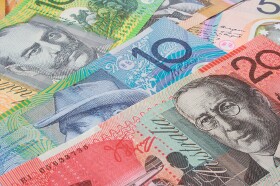The Australian dollar gained on its most-traded peers today even as the nation’s central bank remained passive and macroeconomic reports released over the trading session were rather unimpressive for the most part.
The Reserve Bank of Australia left its main interest rate unchanged at 1.5%, as was widely expected. The central bank did not change its statement much, though mentioned the impact of prospects for trade wars:
Equity market volatility has increased from the very low levels of last year, partly because of concerns about the direction of international trade policy in the United States.
The bank added further:
There has, however, been some tightening of conditions in US dollar short-term money markets, with US dollar short-term interest rates increasing for reasons other than the increase in the federal funds rate. This has flowed through to higher short-term interest rates in a few other countries, including Australia.
As for macroeconomic reports, the manufacturing index from the Australian Industry Group was the only unquestionably positive one, rising from 57.5 in February to 63.1 in March. Meanwhile, ANZ job advertisements remained unchanged last month after falling 0.3% the month before. The RBA Index of Commodity Prices fell 0.6% in March from the previous month and 2.1% from a year ago. The drop was led by the decline of iron ore prices.
AUD/USD rallied from 0.7660 to 0.7690 as of 10:40 GMT today, touching the high of 0.7707 intraday. EUR/AUD dropped from 1.6054 to 1.6002. AUD/JPY climbed from 81.08 to 81.66.
If you have any questions, comments or opinions regarding the Australian Dollar,
feel free to post them using the commentary form below.
